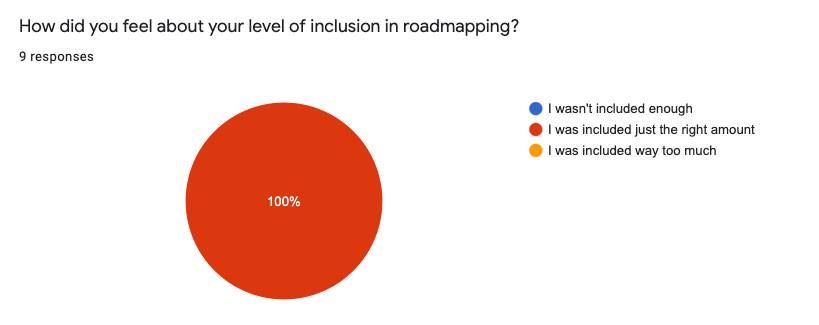#19 🤝 How I built trust with my team as a new PM
I joined Facebook as a product manager last June. This is the 5-step recipe I followed to build trust with my team early on.
I've come to see product management as the art and science of pinpointing the most meaningful problems and converting them into impactful products by having the right people solve them with the minimum possible effort. And making the right tradeoffs along the way.
To pull this off well, a PM requires multiple dimensions of trust from their team:
trust in ability to pinpoint meaningful problems
trust in commitment to solving these problems by leveraging the team's strengths
trust in ability to be the judge of the right scope (not too small, not too big)
trust in making the right tradeoffs
While building trust doesn't guarantee success, mistrust from the team almost guarantees failure.
To be successful as a PM at Facebook (I joined last June), I needed to build trust with my team early on. This note describes how I established myself as a trusted leader on the team.
#1 Identify Characters + Prioritize and Schedule
The first step is putting together a list of all the people you need to meet. I spent time with my manager (who was the PM for my team before I joined) compiling a "cast of characters" to get a sense for who does what and how I might prioritize meeting them.
Naturally, the top of my list included the people on my core team (EM, 8 engineers, 2 UXRs, DS, EM, DE, PD, 3 PMMs). Then were the other PMs in my team's parent org. Then parent org leads. Then our key business partners. My initial list included about 40 people.
Setting up the calls came next. I reached out to each person on the list to say hi and asked if they’d be interested in spending 30 minutes to meet so I can learn more about their experience with our team. 100% of them said yes.
I decided to prioritize the core team meetings for the first 2-3 weeks and worked my way to the rest of the people in the following few weeks.
#2 State Your Intention + Shamelessly Take Notes
Each call started with introductions: I’d ask how long they’ve been at FB, what they’re most excited about currently, how’s the transition to remote work during COVID had been for them, etc.
After the other person told me about themselves, they’d usually ask about my background and I’d give them an overview of my career journey to FB, personal life, and why I chose to join the team.
These personal intros usually took the first 5-10 minutes of the call, after which I would intentionally segue into the next part of the conversation.
[Philosophical note: I dislike when new people join and start changing things before they understand how things evolved to where they are. I've seen new people join and change things in their first month. My personal view is that leaders shouldn’t make changes until they’ve understood the backstory for how and why things ended up in their current configuration. It demonstrates respect for the team and its journey to the present moment.]
With intros out of the way, I shared my intention for the conversation:
I see the joining of a product manager as a pivotal moment in a team’s story; PMs at a company like Facebook hold a lot of responsibility and I take that responsibility seriously.
I'm not here to pass judgement or criticize anything that was done in the past; I know everyone has made the best decisions with the information they had at the time and I have a deep respect for the history of the team. Those past decisions are what led to the team's success which is why I'm here - to help us grow to the next level!
In order to best serve the team moving forward, I need to understand it first. I'll be digging into a lot of areas and asking a lot of questions with the goal of understanding the rationale behind everything from our team strategy & mission down to the roadmap and the specific projects we're working on.
The joining of a new PM is a true window of opportunity to change things for the better; I'm looking to understand the team’s superpowers and areas for improvement. This way, when I inevitably start making changes, I'll be able to separate the baby from the bathwater.
With that said, I have two questions for you:
1) What are the team's superpowers? What are we really good at? What is working so well that I could really only mess it up?
2) What's holding us back? What would you like to see change or evolve in the next few months?
If you see me typing, I promise I'm fully paying attention. I just want to make sure my memory doesn't fail me later so I need to write things down.
Then I sat quietly and listened while taking notes, only chiming in to clarify anything that wasn't clear to me.
#3 Identify Themes and Present Back
Combing through my notes from dozens of these calls, some clear themes started to emerge.
I wrote these down and a month after joining the team, gave a 30 minute presentation in our biweekly team meeting. I walked the team through my observations, broken down into three sections:
team strengths/superpowers (for us, this was primarily around execution and quality - once we knew what to build, it was done efficiently and done well)
problems and areas for improvements (for us, this was primarily around measuring the impact of our work and involving the XFNs on the team more directly in roadmapping).
potential changes we might want to make based on these*
This exercise helped establish myself as an informed leader who cares. I was the only person who spoke with every single person on the team in this manner so the findings were genuinely interesting/novel to people on the team. I was holding up a mirror, showing the team exactly what they were thinking and feeling.
While each of my teammates obviously knew their own perspective intimately, they didn't know how the rest of the team was feeling. By collecting each person's input, I was able to get everyone on the same page about how we were feeling as a unit.
#4 Invite Follow-Ups
When I was done, I invited the team to chime in with any comments, gaps or inaccuracies to keep me honest in case I got something wrong or overlooked major items. If they were uncomfortable speaking up with a large group, I invited a direct message over chat and/or a follow-up 1:1 call.
This demonstrated an openness to feedback and criticism and I rewarded everyone who reached out by making more time to hear their thoughts. My door would always be open and now they knew it.
#5 Prove Your Commitment
The two biggest areas for improvement from our team were around measuring the impact of our work and making roadmapping more inclusive. In my first half, we made exciting progress on both of these.
On the measurement front we've been able to demonstrate measurable impact with a couple new experiments. On the roadmapping inclusion front, we ran an extremely inclusive and transparent roadmapping process which involved everyone on the team. I sent out a survey in January and 100% of respondents said they felt included just the right amount. I consider that a win.
Conclusion
This exercise in my first month helped my team trust me as a problem-solver who respected the team's journey to this point and was committed to leveraging our team's superpowers while improving the aspects that were holding us back.
Almost nine months later, I'm proud to say that our team has been performing well, morale is high, and we've been successful in fostering a culture of open communication.
* I was on the fence with #3 because it was getting into the territory of making changes too early. But I decided to take the risk anyway because the upside was that I was demonstrating an ability to think of new ways of doing things and opening the door to feedback if anyone disagreed with me. In hindsight, I don't think any of the ideas I shared materialized but it led to productive follow ups with individual members of the team, which definitely shaped my thinking over the last nine months.
This post has been published on www.productschool.com communities.




